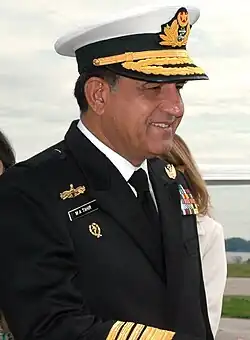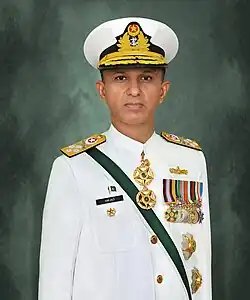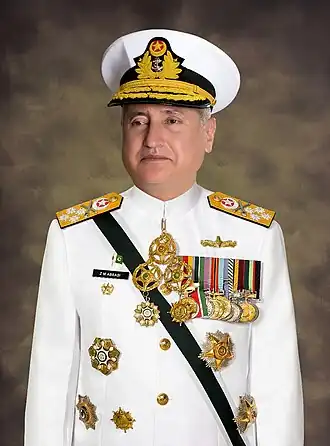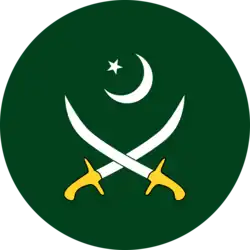National Defence University (Pakistan)
Urdu: جامعہ قومی دفاعِ پاکستان | |
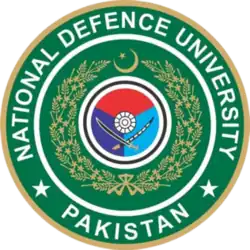 Seal of the NDU | |
Former name | National Defence College |
|---|---|
| Motto | Arabic: عَلَّمَ الْإِنْسَانَ مَا لَمْ يَعْلَمْ (al-Quran (30:96:5)) |
Motto in English | "taught man which he knew not" |
| Type | Military |
| Established | 28 May 1970 |
| Affiliation | |
Academic affiliation | Higher Education Commission |
| Chancellor | President of Pakistan |
| President | Lieutenant general Babar Iftikhar |
| Vice-president | Rear admiral Javaid Iqbal |
| Dean | Professor Dr. Arshi Saleem Hashmi |
| Students | 4,000 |
| Undergraduates | 3000 |
| Postgraduates | 500 |
| 100 | |
| Location | , , Pakistan 33°43′19″N 73°01′20″E / 33.72194°N 73.02222°E |
| Campus | Urban |
| Language | English, Urdu |
| Colors | Green, White, Khaki |
| Website | www |
The National Defence University (NDU), formerly introduced as Army War Course (1963–70),[a] the National Defence College (1970–2007), is the military university of the Islamic Republic of Pakistan focused on military education and training for the armed forces, including Pakistan military forces and two hundred foreign participants.[1] Formerly established on 28 May 1970 at Rawalpindi, its academic principles are focused on command instructions, national security, military strategy, and war studies among other specified academic disciplines.[2][3] It is one of the oldest military education and training institutes in the country with additional enrollments reserved for the civil servants.[4]
Major general, then-general Abdul Hamid Khan served as its first commandant, while brigadier Muhammad Ahmed was appointed the first chief instructor.[2] The president of the Islamic Republic of Pakistan serves its chancellor while the chief of staff recommends appointment and the removal of its president, usually a three star armed officer.[5][6] Nearly 44 years later of its establishment as Armed War Course, it was awarded the status of university after being recognised by the Higher Education Commission of Pakistan on 5 February 2007 while the former Armed War Course (later re-designated as Armed War Forces Course) became one of its components.[7][8]
History
The origin of the National Defence University is historically associated with major general, the then lieutenant general, Sahabzada Yaqub Khan and Command and Staff College who introduced Army War Course on 1 May 1963 to Command and Staff College after he was asked in 1962 to establish a separate and a single purpose war course to that college. It initially comprised twelve participants (known as students and faculty members), including two from armed forces – one from navy and other from air force. With the continuation of war studies, its participants were increased to sixteen in 1965. However, staff college was left without war course faculty following the 1965 conflict between India and Pakistan. The discontinuation of the faculty gained attention of the authorities, and the National Defence College (NDC), a stand-alone institute was established on 28 May 1970 at Lalkurti area of Rawalpindi Cantonment. It was housed in the Ayub Hall of the old National Assembly Building.[2] The institute was later shifted to its permanent building where it worked for nearly 25 years.
During that 25 years, the college was re-designated multiple times, including in 1971 when the Army War Course was awarded the status of the Armed Forces War Course to serve for armed forces than only army. The number of faculty participants were increased from sixteen to twenty, with three officers from navy and air force.
To award the officers MSc degree in war studies, the prime minister, Zulfiqar Ali Bhutto signed an order in 1975 to affiliate the NDC with Federal University of Islamabad (in modern-day Quaid-i-Azam University). Five years later of affiliation with Quaid university, military dictator Muhammad Zia-ul-Haq, the then 6th president of Pakistan signed an order in February 1980 to shift the college to the capital city Islamabad for its space expansion. Following that order, it was shifted to the new building on 17 August 1995.
The government of Pakistan upgraded it to university in 2007, while the Naval War College gained the status of Armed Forces War College, which is now a component of the National Defence University. As of March 2007, the NDU acts as a nation university in the country, and the two years later of its upgradation, Joint Chiefs of Staff Committee redesignated both Army War Course, Armed Forces War Course, and National Defence Course faculties into one single component of the university, which is now known as National Security and War Course.[2]
Amendments
The parliament of Pakistan introduced an act in 2011 titled National Defence University, Act 2011, outlining the academic, administration, and financial amendments, in addition to establishment of the NDU. It was formerly signed by the president on 14 May 2011 after majlis-ash-shura such as the National Assembly and the Senate passed the bill. It functions under that act, however employing officers, teacher and other staff members are governed by the Higher Education Commission Ordinance, 2002. The act restrict government and other authorities to qualify or disqualify the officers, teachers, students, or any other participant associated with the university, on the grounds of their "gender, religion, race, creed, class, colour, or domicile".[6]
The act identifies the chancellor, president, dean, commandant (director general), chairperson (chief instructor), registrar, controller examination, director administration and director finance as the principal officers and also determines their powers and the functions.
Appointments
The act allows the president of Pakistan to act as the chancellor, while the president of the university is recommended by the chief of Army Staff for the final approval of the chancellor. If the post of university president falls vacant due to any uncertainty such as health complications or death, it is not assumed by the other members with an additional charge of the president. The post is generally assumed for the term of five years, however the incumbent may be terminated if recommended by the army chief.[6]
Buildings and sites

Since its formation as a faculty and then college in Rawalpindi, it was shifted several times from one building to other, including the old national assembly near Rawalpindi Cantonment until it was permanently shifted to Islamabad in 1995. The main building is now located in Sector E-9, Islamabad near Margalla Hills.[1]
Emblem
The emblem (generally identified as logo, although the official description of emblem does not mention "logo") of the NDU is circular in form with a green field bordered in gold, carrying the university's name in white capital letters. At its centre is an Islamic shield divided into the three service colours of the Pakistan Armed Forces: blue for the Air Force, red for the Army, and navy blue for the Navy. Superimposed on the shield is a pen and a sword crossed diagonally, suggesting the union of knowledge and military strength. Behind these elements appears a stylised wheel, representing continuity, discipline, and progress. The shield is encircled by golden wreaths, a traditional emblem of honour and achievement, while the star and crescent at the top suggests the national identity of Pakistan.[9]
عَلَّمَ ٱلْإِنسَـٰنَ مَا لَمْ يَعْلَمْ ٥ [Taught man that which he knew not]
— Al-Alaq (30:96:5)
The emblem incorporates the university's Quranic verse: "taught man that which he knew not" (Al-Quran, 96:5), denoting the institution's role in the advancement of learning alongside professional military education.[9]
Composition
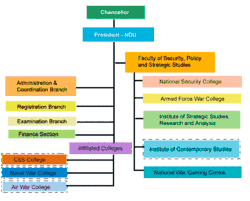
The NDU is headed by the chancellor, the president of Pakistan, and administered by the president of NDU, a three-star military officer (lieutenant general or equivalent) who serves as the chief executive and commandant of the institution. He is assisted by a deputy president (a two-star officer). The university is organized into three major academic and research divisions: the Faculty of Security Studies (FSS), the Faculty of Contemporary Studies (FCS), and the Institute for Strategic Studies, Research and Analysis (ISSRA). Each division is overseen by a dean or director general, and houses several colleges, departments, or research branches. Together, these units integrate military education, policy research, and academic studies under a unified framework.[10]
Faculty of Security Studies (FSS)
The faculty is headed by a dean, provides professional military education for senior officers.[11] It is comprised of:
- National Security College – conducts courses on national security policy, strategy, and statecraft for senior military and civil officers.
- Armed Forces War College – offers higher military education at the operational and strategic levels, preparing officers for senior command and staff positions.
- Allied Officers Division (AOD) – trains officers from allied and partner nations, promoting military diplomacy and international cooperation.[12]
Faculty of Contemporary Studies (FCS)
The Faculty of Contemporary Studies, also led by a dean, delivers academic programs in social sciences and policy studies.[13] Its departments include:
- Department of Government and Public Policy (GPP) – focuses on governance, public administration, and policy analysis.
- Department of Peace and Conflict Studies (PCS) – specializes in conflict resolution, mediation, and peacebuilding.
- Department of Strategic Studies (SS) – engages in the study of strategy, defence policy, and international security.
- Department of Leadership and Management Studies (LMS) – provides training in organizational leadership, management sciences, and project management.
- Department of International Relations (IR) – covers global politics, diplomacy, and foreign policy analysis.[13]
Institute for Strategic Studies, Research and Analysis (ISSRA)
The Institute for Strategic Studies, Research and Analysis is headed by a director general (a two-star officer) and functions as the premier think tank of NDU.[14] It consists of several specialized divisions:
- Global and Regional Studies – analyzing international and regional strategic trends.
- Internal Security Studies – focusing on domestic security challenges and counter-terrorism.
- Defence and Strategic Studies – examining defence policies and strategic doctrines.
- Coordination and Collaboration – overseeing academic and institutional partnerships.
- Research and Publication – producing academic and policy-oriented publications.
- Keystone, Capstone and Pinnacle Program – advanced courses for senior leadership and policymakers.
- Centre of Excellence for International Law – dedicated to research and training in international legal frameworks.
- Sahabzada Yaqub Khan Library – the university's central research library and archival resource.[15]
Constituent colleges
The NDU maintains several constituent colleges that provide professional military education to officers from different branches of the Pakistan Armed Forces. These colleges operate under the academic umbrella of NDU and are accredited to award postgraduate qualifications. The constituent colleges are:
Command and Staff College, Quetta – the premier institution for training mid-career Pakistan Army officers, preparing them for command and staff appointments at the operational level.[16]
Pakistan Navy War College, Lahore – the principal higher education institution of the Pakistan Navy, focusing on maritime strategy, naval operations, and leadership.[17]
School of Artillery, Nowshera – the army's central training establishment for artillery officers, responsible for professional gunnery, firepower coordination, and tactical employment of artillery forces.
Facilities
Library
The university maintains a central library that houses both print and digital resources. Its print collection consists of approximately 70,000 volumes, including books, back issues of periodicals, professional journals, government publications, reports, and newspapers. In addition, the library provides access to the Higher Education Commission of Pakistan's National Digital Library, which offers thousands of electronic books and scholarly journals.[18]
The library also operates a Digital section, which serves as a resource centre for selected books, periodicals, newspaper articles, university publications, and links to international databases. It maintains digital newspaper clipping files on subjects of topical interest. In addition to the main collection, the university runs a fiction library, catering to general reading, and each college within NDU maintains its own seminar library to support specialized academic needs.[18]
National War Gaming Centre
The NDU operates the National War Gaming Centre (NWGC), which is equipped with the joint theater level simulation (JTLS) system, a NATO-standard computer-assisted war-gaming platform. The centre is used by the Pakistan Army, Navy, and Air Force to conduct strategic and operational-level exercises. It provides a simulated environment for war planning, military operations other than war, and disaster management scenarios.[18]
Halls and auditoria
The NDU maintains several halls and auditoria that are used for teaching, research events, and professional training.[18]
- Auditorium – The main auditorium serves as a venue for combined lectures, discussions, and extracurricular activities. It can accommodate around 560 participants and is fitted with audiovisual facilities to support large gatherings.[18]
- NS Hall – Operated by the Institute for Strategic Studies, Research and Analysis (ISSRA), it is used for seminars, international conferences, and workshops, including the National Security Workshop, the National Media Workshop, and senior professional development courses.[18]
- National Defence Hall (ND Hall) – it is primarily used by the Armed Forces War College for academic instruction. It hosts lectures, panel discussions, study sessions, and student presentations.[18]
- ISSRA Hall – It is reserved for ISSRA's in-house academic activities, such as local seminars, conferences, post-visit briefings, and exchanges with think tanks.[18]
Mapping section
The Mapping section provides cartographic support for academic and training activities. It is responsible for producing maps required for courses and exercises.[18]
Academic profile
Teaching and degrees
The National Defence University's contemporary studies faculty award bachelor's, master of philosophy and doctorate degrees in various academic fields such as international relations, and public policy among others.[4]
Faculty of Contemporary Studies
- ECONOMICS (ECO)
- BS
- M.Phill
- Ph.D
- Leadership and Management Studies (LMS)[19]
- BS
- M.Phil
- MS-PM
- Ph.D
- Government and Public Policy (GPP)
- BS
- M.Phill
- Ph.D
- Strategic Studies (SS)
- BS
- M.Phill
- Ph.D
- International Relations (IR)
- BS
- M.Phill
- Ph.D
- Peace and Conflict Studies (PCS)
- BS
- M.Phill
- Ph.D
Role as a think tank
The NDU's wing Institute for Strategic Studies, Research & Analysis (ISSRA) acts as a national think tank on national security matters, and is reportedly an internal part of the National Security Division, headed by a national security division secretary.[20] Inputs are provided to the government and armed forces to maintains academic links with domestic and foreign think tanks and defence universities with which Pakistan shares friendly relations.[21]
List of presidents/commandants
| No. | President/Commandant | Term[22] | |||
|---|---|---|---|---|---|
| Portrait | Name | Took office | Left office | Term length | |
| President of the National Defence University | |||||
| 1 | Lt Gen. Abdul Hameed Khan (1917–1984) | 19 July 1970 | 7 December 1970 | 141 days | |
| 2 | Major General Nasir Ahmad Chaudhri (1920–2010) | 3 April 1972 | 19 July 1974 | 2 years, 107 days | |
| 3 | Major General M. Rahim Khan | 20 July 1974 | 31 August 1975 | 1 year, 42 days | |
| 4 | AVM Michael John O'Brian (1928–1995) | 1 September 1975 | 9 April 1976 | 221 days | |
| 5 | Lt Gen. Azmat B. Awan | 9 April 1976 | 30 October 1978 | 2 years, 204 days | |
| 6 | Major General Anwar Masood | 1 October 1978 | 1 September 1979 | 335 days | |
| 7 | Lt Gen. Ejaz Azim | 10 September 1979 | 9 April 1980 | 212 days | |
| 8 | Major General Nishat Ahmed | 10 April 1980 | 20 June 1984 | 4 years, 71 days | |
| 9 | Lt Gen. S M H Bokhari | 21 June 1984 | 4 January 1988 | 3 years, 197 days | |
| 10 | Lt Gen. Muhammad Safdar (1934–2023) | 5 January 1988 | 31 July 1989 | 1 year, 207 days | |
| 11 | Lt Gen. Zakir Ali Zaidi | 1 August 1989 | 18 June 1990 | 321 days | |
| 12 | Lt Gen. Rehmdil Bhatti | 8 September 1990 | 9 February 1993 | 2 years, 154 days | |
| 13 | Lt Gen. Asad Durrani (born 1941) | 10 February 1993 | 14 May 1993 | 93 days | |
| 14 | Lt Gen. Iftikhar Ali Khan (1941–2009) | 15 May 1993 | 17 June 1993 | 33 days | |
| 15 | Lt Gen. Syed Tanveer Hussain Naqvi | 18 June 1994 | 31 January 1996 | 1 year, 227 days | |
| 16 | Lt Gen. Muhammad Maqbool | 1 February 1996 | 4 June 1998 | 2 years, 123 days | |
| 17 | Lt Gen. Mahmud Ahmed | 5 June 1998 | 25 October 1998 | 142 days | |
| 18 | Lt Gen. Salahuddin Tirmizi | 25 October 1998 | 2 March 2000 | 1 year, 129 days | |
| 19 | Lt Gen. Saeed Uz Zafar | 13 March 2000 | 29 October 2000 | 230 days | |
| 20 | Lt Gen. Javed Hassan | 30 October 2000 | 3 January 2004 | 3 years, 65 days | |
| 21 | Lt Gen. Tariq Waseem Ghazi | 3 January 2004 | 16 October 2004 | 287 days | |
| 22 | Lt Gen. Shahid Hamid | 17 October 2004 | 4 November 2005 | 1 year, 18 days | |
| 23 | Lt Gen. Raza Muhammad Khan | 7 November 2005 | 30 June 2007 | 1 year, 235 days | |
| 24 | Lt Gen. Muhammad Hamid Khan | 1 July 2007 | 11 October 2009 | 2 years, 102 days | |
| 25 | Lt Gen. Muhammad Yousaf | 12 October 2009 | 15 September 2010 | 338 days | |
| 26 | Lt Gen. Agha Muhammad Umer Farooq | 8 October 2010 | 21 July 2012 | 1 year, 287 days | |
| 27 | Lt Gen. Nasser Khan Janjua | 30 July 2012 | 26 August 2013 | 1 year, 27 days | |
| 28 | Lt Gen. Javed Iqbal Ramday | 26 August 2013 | 30 April 2015 | 1 year, 247 days | |
| 29 | Lt Gen. Anwar Ali Hyder | 1 May 2015 | 10 April 2016 | 345 days | |
| 30 | Lt Gen. Nazir Ahmed Butt | 11 April 2016 | 19 December 2016 | 252 days | |
| 31 | Lt Gen. Rizwan Akhtar | 20 December 2016 | 9 October 2017 | 293 days | |
| 32 | Lt Gen. Majid Ehsan | 24 October 2017 | 14 December 2018 | 1 year, 51 days | |
| 33 | Lt Gen. Aamer Riaz | 15 December 2018 | 4 October 2019 | 293 days | |
| 34 | Lt Gen. Muhammad Saeed | 28 November 2019 | 7 November 2021 | 1 year, 344 days | |
| 35 | Lt Gen. Nauman Mehmood | 23 November 2021 | 24 April 2023 | 1 year, 152 days | |
| 36 | Lt Gen. Rahat Naseem Ahmed Khan | 03 May 2023 | 30 November 2023 | 211 days | |
| 37 | Lt Gen. Asif Ghafoor | 1 December 2023 | 20 December 2024 | 1 year, 291 days[23] | |
| 38 | Lt Gen. Babar Iftikhar | 22 January 2025 | Incubent | [24] | |
Notable alumni
Throughout its history from a college to university, some of its alumni and faculty members became notable in academic, politics, military and many other varied fields.
Many Pakistani generals, including Ashfaq Parvez Kayani, Ehsan ul Haq, and Raheel Sharif attended the National Defence University. Kayani graduated from National Defence College and also remained faculty member of the university.[25] Ehsan ul Haq graduated from NDU and Command and Staff College, Quetta, an affiliated institute of the university.[26] Raheel Sharif is among the other generals who attended the university.[27]
In addition to Pakistani generals, some alumni from the naval department became notable in their respective fields. Admiral Afzal Tahir graduated from the National Defence College,[28] while Shahid Karimullah, attended armed forces war course department of the National Defence College.[29] Zafar Mahmood Abbasi is also an alumnus of the university[30] while Amjad Khan Niazi graduated from NDU and Command and Staff College.[31]
Musharraf, the 10th president of Pakistan graduated from the National Defence College and Command and Staff College, Quetta, an affiliated institute of NDU.[32]
Publications
- NDU Journal is an annual feature of the university which is based on the research papers by the students, researchers, and policy makers. The publications provide ideas on issues of national security of Pakistan. Before an article is published in the journal, it is single peer reviewed.[33]
- Margalla Papers is biannual publication, concerning contemporary global politics, globalization, foreign policy, strategic alliance, economic partnerships, and regional organization. It also involves the role of United Nations peacekeeping, law of nations and global commons.[34]
- ISSRA Paper is an annual academic publication of Institute for Strategic Studies, Research and Analysis (ISSRA). It cover the issues relating governance, public policy, in addition to promotion of awareness to that issues. It is contributed by anyone, however articles are single peer-reviewed before they appear in journal.[35]
- NDU Monograph is a scholarly journal of ISSRA. It is contributed by the researchers on military issues and collaboration.[36]
- Strategic Thought is a peer-reviewed academic journal published by the Institute for Strategic Studies, Research and Analysis (ISSRA). It focuses on security and strategic studies, including topics such as foreign policy, defense planning, regional geopolitics, and national security. The journal publishes original research articles and policy analyses, aiming to bridge the gap between strategic practice and theory.[37]
- AFWC Journal is a journal of Armed Force War Course which publishes the public opinions contributed by the participants.[38]
- The Journal of Contemporary Studies (JCS) is a biannual peer-reviewed academic journal published by the Faculty of Contemporary Studies (FCS). Established in 2012, it covers research in international relations, political science, security, and strategic studies, and publishes articles, book reviews, and scholarly documents in English.[39]
See also
- Military academies in Pakistan
- Pakistan Military Academy
- Pakistan Air Force Academy
- Air University Pakistan
References
- ^ a b "PAKISTAN ARMY". PAKISTAN ARMY. 10 September 2021. Archived from the original on 10 September 2021. Retrieved 12 September 2021.
- ^ a b c d "National Defence University, Islamabad". ndu.edu.pk. 21 March 2021. Archived from the original on 21 March 2021. Retrieved 12 September 2021.
- ^ Reddy, B. Muralidhar (25 May 2011). "Pakistan's military officers, seen through American eyes". The Hindu. Retrieved 13 September 2021.
- ^ a b "NDU Islamabad: Here's Everything You Need To Know About It". The Academia. 24 April 2019. Retrieved 12 September 2021.
- ^ NDU President. "President of the National Defence University". www.ndu.edu.pk. Retrieved 26 March 2015.
- ^ a b c "Acts, ordinances, president's orders and regulations" (PDF). na.gov.pk. 27 October 2020. Archived from the original (PDF) on 27 October 2020. Retrieved 12 September 2021.
- ^ "Universities". hec.gov.pk. 8 April 2019. Archived from the original on 8 April 2019. Retrieved 12 September 2021.
- ^ "National Defence University background". ndu.edu.pk. Archived from the original on 25 September 2018.
- ^ a b "National Defence University, Islamabad". ndu.edu.pk. 21 March 2021. Archived from the original on 21 March 2021. Retrieved 12 September 2021.
- ^ "National Defence University, Islamabad". 21 March 2021. Archived from the original on 21 March 2021. Retrieved 12 September 2021.
- ^ "National Defence University". ndu.edu.pk. 14 April 2025. Archived from the original on 27 May 2025. Retrieved 19 August 2025.
- ^ "National Defence University". ndu.edu.pk. 14 April 2025. Archived from the original on 23 July 2025. Retrieved 19 August 2025.
- ^ a b "Faculty of Contemporary Studies". ndu.edu.pk. 14 April 2025. Archived from the original on 23 July 2025. Retrieved 19 August 2025.
- ^ "Institute For Strategic Studies, Research and Analysis". issra.pk. 1 June 2025. Archived from the original on 22 July 2025. Retrieved 19 August 2025.
- ^ "NDU Library Islamabad Pakistan". 111.68.99.107. 27 September 2024. Archived from the original on 27 January 2025. Retrieved 19 August 2025.
- ^ "College History – Command and Staff College Quetta". Command and Staff College Quetta – PIR SHO BIAMOOZ SAADI. 11 August 2012. Archived from the original on 21 May 2025. Retrieved 19 August 2025.
- ^ "Pakistan Navy War College, Lahore". pnwc.paknavy.gov.pk. 22 December 2023. Archived from the original on 24 June 2024. Retrieved 19 August 2025.
- ^ a b c d e f g h i "National Defence University, Islamabad". ndu.edu.pk. 15 December 2024. Archived from the original on 27 January 2025. Retrieved 19 August 2025.
- ^ "National Defence University, Islamabad". ndu.edu.pk. 12 July 2020. Archived from the original on 30 September 2020. Retrieved 19 August 2025.
- ^ Kartha, Tara (20 March 2021). "Pakistan's changing idea of national security". Tribuneindia News Service. Retrieved 13 September 2021.
- ^ Noor, Sitara (28 March 2021). "Democratising the debate". The News International. Retrieved 13 September 2021.
- ^ "President". National Defence University, Islamabad. Retrieved 15 December 2024.
- ^ "National Defence University, Islamabad". ndu.edu.pk. 15 December 2024. Archived from the original on 27 January 2025. Retrieved 12 August 2025.
- ^ Ahmed, Raja Furqan (22 January 2025). "High-level transfers, postings in army – The Pakistan Daily". The Pakistan Daily. Archived from the original on 22 January 2025. Retrieved 12 August 2025.
- ^ Pike, John (29 November 2007). "Ashfaq Parvez Kayani". GlobalSecurity.org. Retrieved 13 September 2021.
- ^ "New JCSC chief, VCOAS appointed". DAWN.COM. 3 October 2004. Retrieved 13 September 2021.
- ^ Pike, John (1 January 1970). "Chief of Army Staff (COAS)". GlobalSecurity.org. Retrieved 13 September 2021.
- ^ "Vice Admiral Afzal appointed Naval chief". Brecorder. 24 September 2005. Retrieved 13 September 2021.
- ^ "New navy chief named". DAWN.COM. 4 October 2002. Retrieved 13 September 2021.
- ^ Web Desk (7 October 2017). "Admiral Zafar Mahmood Abbasi assumes command of Pakistan Navy". The News International. Retrieved 13 September 2021.
- ^ "Admiral Amjad Khan Niazi assumes command as Chief of Naval Staff". The Express Tribune. 7 October 2020. Retrieved 13 September 2021.
- ^ "Pervez Musharraf giography". britannica.com. Retrieved 15 September 2021.
- ^ "National Defence University, Islamabad". ndu.edu.pk. 21 March 2021. Archived from the original on 21 March 2021. Retrieved 12 September 2021.
- ^ "National Defence University, Islamabad". ndu.edu.pk. 21 March 2021. Archived from the original on 21 March 2021. Retrieved 12 September 2021.
- ^ "National Defence University, Islamabad". ndu.edu.pk. 21 March 2021. Archived from the original on 21 March 2021. Retrieved 12 September 2021.
- ^ "National Defence University, Islamabad". ndu.edu.pk. 21 March 2021. Archived from the original on 21 March 2021. Retrieved 12 September 2021.
- ^ "Strategic Thought". strategicthought.ndu.edu.pk. 8 April 2021. Archived from the original on 21 May 2025. Retrieved 18 August 2025.
- ^ "National Defence University, Islamabad". ndu.edu.pk. 21 March 2021. Archived from the original on 21 March 2021. Retrieved 12 September 2021.
- ^ Ehsan, Dr. Muhammad Ali; Muhammad, Raza; Haider, Dr. Naeem; Akhtar, Dr. Shaheen; Khan, Muhammad Shakeel; Zia, Dr. Anjum; Nadeem, Hira; Abid, Dr. Faiza; Kallimullah, Dr. Amna Mahmood (4 November 2021). "Journal of Contemporary Studies". jcs.ndu.edu.pk. Archived from the original on 23 July 2025. Retrieved 18 August 2025.
Notes
- ^ AWC was a military faculty, not an independent institute. It was introduced to Command and Staff College, and represents historical concept responsible for the origin of NDU. It is now a component of NDU known as National Security and War Course.
External links
- National Defence University FAQ at the official website

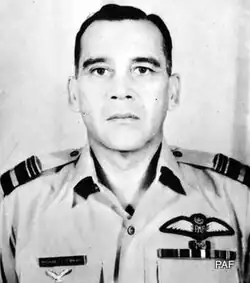
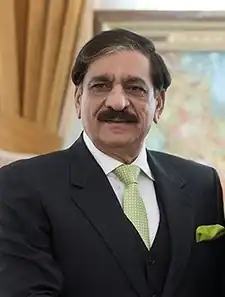

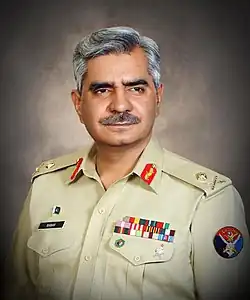
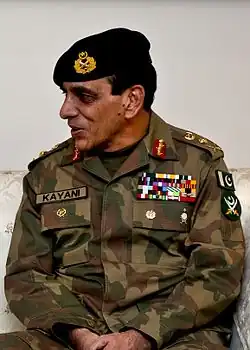
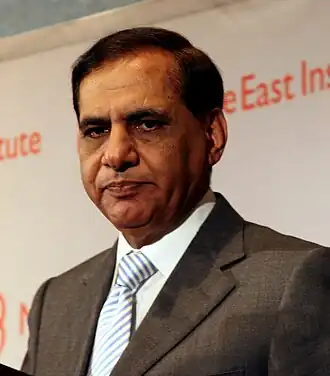
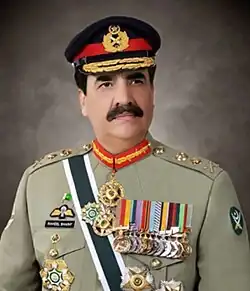
.jpg)
